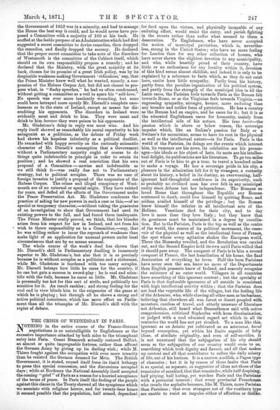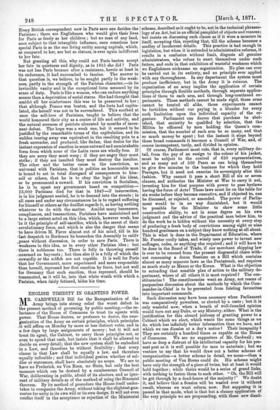THE CRISIS OF WEDNESDAY IN PARIS. for food upon the
victors, and physically incapable of any enduring effort, would resist the entry, and perish fighting in the streets rather than suffer what seemed to them a
desecration. To Englishmen, who have never accepted the notion of municipal patriotism, which is, neverthe- less, strong in the United States ; who have no more feeling for London than for any other collection of houses, who have never shown the slightest devotion to any municipality, and who, while heartily proud of their country, have little or no enthusiasm for any locality within it, devotion of this kind seems almost childish, and indeed it is only to be explained by a reference to facts which, as they do not exist here, excite here little sympathy. Partly from his history, partly from the peculiar organization of his political system, and partly from the strength of the municipal idea in all the Latin races, the Parisian feels towards Paris as the Roman felt towards Rome, or as the Virginian feels towards Virginia,—an engrossing sympathy, stronger, keener, more enduring than any broader and nobler form of patriotism. He has a country as the Roman had an empire, and he cares for it ; but it is as the educated Englishman cares for humanity, mainly from the intellectual side of his nature. His true heart—the passion which is above or below reason, the sovereign impulse which, like an Italian's passion for Italy or a Switzer's for mountains, seems to have its root in the physical as well as the intellectual nature—is for Paris. Paris is the world of the Parisian, its doings are the events which interest him, its rumours are his news, its celebrities are his person- ages—his ideals or his object of hate, its mots are his intellec- tual delight, its publications are his literature. To go ten miles out of Paris is to him to go a tour, to travel a hundred miles to make a voyage. He has a sovereign pride in his city, a pleasure in the admiration felt for it by strangers, a curiosity about its history, a belief in its destiny, an overweening, half- ignorant half-thoughtful confidence in its superiority, such as probably no civilized man has ever felt in any municipal entity since Athens lost her independence. The Romans so loved Rome that throughout the Republic any Roman sentenced to death, could free himself by quitting !tome, and seldom availed himself of the privilege ; but the Roman knew himself the inferior in all intellectual arts of the Hellene. Venetians died for their city, and to day love it more than they love Italy ; but they knew that its greatness must be maintained in a degree by concilia- tion. But to the Parisian, Paris is the top as well as the centre of the world, the source of its political movement, the reser- voir of the physical as well as the intellectual force of France, the spot whose every agitation shakes the European world. There the Monarchy revelled, and the Revolution was carried out, and the Second Empire held its own until Paris willed that it should pass away. The conquest of Paris is to him a second conquest of France, the last humiliation of his home, the final desecration of everything he loves. Half the born Parisians have never seen the sea, know no more of the Departments than English peasants know of Ireland, and scarcely recognize the existence of an outer world. Villagers in all countries have something of this ignorant content ; but the specialty of Paris is that deplorable ignorance of all outside is consistent with high intellectual activity within ; that the Parisian does not lead the vegetable life of the villager, but the boiling life of the Athenian, who, while classing all other men as barbarians, believing that elsewhere all was forest or desert peopled with monsters, careless of travel, and utterly unaware of literature not Athenian, still heard what Demosthenes said with active comprehension, criticized Sophocles with keen discrimination, or judged with a cool educated regard art which in all its centuries the world has not yet rivalled. To a man like this, ignorant as an Asiatic yet cultivated as an aristocrat, bora beyond conception, yet within his limits capable of lofty ideas, of absolute originality, and even of self-sacrifice, it is not unnatural that the subjugation of his city should seem as the subjugation of our country would seem to us, something which took dignity and flavour, and all that wakes up content and all that contributes to soften the daily misery of life, out of his horizon. It is a narrow, a selfish, a Pagan type of character ; but it is by reason of those faults that Paris is so special, so separate, so suggestive of ideas not those of the remainder of mankind, that that remainder, while half despising, half pitying, half hating, yet watches Paris and the Parisians with a perennial interest ; that every provincial Frenchman who treads the asphalte becomes, like M. Thiers, more Parisian than Parisians ; that even strangers not of the southern type are unable to resist an impulse either of affection or dislike.
Every British correspondent now in Paris save one derides the Parisians ; there are Englishmen who would give their lives for Paris as freely as her children ; but no man of any land, once subject to that intangible influence, once conscious how special Paris is as the one living entity among capitals, which, as compared to her, are but as statues, is ever again indifferent to her fate.
But granting all this, why could not Paris beaten accept her fate in quietness and dignity, as in 1815 she did ? Paris was not less Paris because after a resistance, heroic at least in its endurance, it had succumbed to famine. The answer to that question is, we believe, to be sought partly in the weak- ness, partly in the strength of the Parisian character,—in its invincible vanity and in the exceptional form assumed by its sense of duty. Paris is like a woman, who can endure anything sooner than a deprivation of social status. She had thought that amidst all her misfortunes this was to be preserved to her ; that although France was beaten, and the forts had capitu- lated, she herself was not to be surrendered. This soothed at once the self-love of Parisians, taught to believe that the world honoured their city as a centre of life and activity, and the natural soreness of patriots ulcerated by months of inces- sant defeat. The hope was a weak one, but it seemed to be justified by the remarkable terms of the capitulation, and its sudden tearing away was equivalent in the resulting pain to a fresh surrender, and produced, like Sedan, that desire for the instant expression of emotion in some outward and unmistakable form from which none of the Latin races are wholly free. If they are sorry they must weep ; if they are angry they must strike ; if they are insulted they must destroy the insulter.
The other and the better cause is the conviction, so universal with Parisians, that in politics an honourable man is bound to act in total disregard of consequences to him- self or others, that he is to obey the logic of his ideas, or be pronounced a coward. If his conviction is Socialism, he is to upset any government based on competition- 13,000 Parisians died for that in 1849—if insurrection, is in his judgment needed, he is to descend into the streets ; in all cases and under any circumstances he is to regard suffering for himself or others as the duellist regards it, as having nothing whatever to do with the matter. Amidst many basenesses, compliances, and transactions, Parisians have maintained and to a large extent acted on this idea, which, however weak, has In it the principle of self-sacrifice, which is the secret of their -revolutionary force, and which is also the danger that seems 'to have driven M. Favre almost out of his mind, till in his .-last despatch to Bordeaux he beseeches the Assembly to ratify ,peace without discussion, in order to save Paris. There is weakness in this idea, as in every other Parisian idea ; but - there is nobleness too. There is folly in throwing oneself unarmed on bayonets ; but then also it is a folly of which the • cowardly or the selfish are not capable. It is well for Paris that her Government, more experienced and more responsible than herself, repressed her first emotion by force, but not well for Germany that such emotion, thus repressed, should be • transmuted, as it will be, into that white wrath with which a Parisian, when fairly fettered, bides his time.



































 Previous page
Previous page